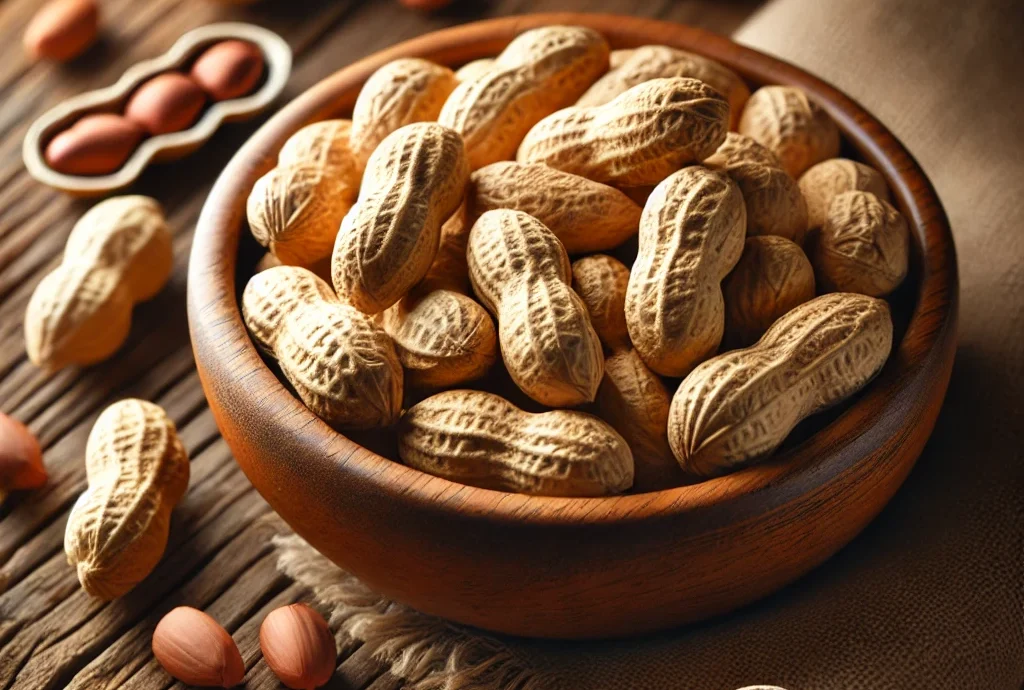Peanuts are a popular and nutritious legume packed with protein, healthy fats, fiber, and essential vitamins and minerals such as vitamin E, magnesium, and niacin. Known for their rich, nutty flavor, peanuts support heart health, aid in weight management, and provide long-lasting energy. Whether enjoyed as a snack, in peanut butter, or added to various dishes, peanuts are a versatile and affordable way to enhance your diet.
Nutritional Benefits of Peanuts
Rich in Nutrients: Peanuts are a good source of essential nutrients, including plant-based protein, healthy fats, vitamins (such as vitamin E and several B vitamins), and minerals (such as magnesium, phosphorus, and potassium).
Packed with Antioxidants: Peanuts are rich in antioxidants such as resveratrol, vitamin E, and flavonoids, which help protect the body from oxidative stress and may lower the risk of chronic diseases like heart disease and cancer. Antioxidants also support healthy skin and aging.
Boosts Immune Function: Peanuts are a good source of vitamin E and zinc, both of which play an important role in supporting immune function and helping the body fight off infections.
Source of Plant-based Protein: Peanuts are an excellent source of plant-based protein, offering about 8 grams of protein per ounce. This makes them a great option for vegetarians and vegans, helping to support muscle growth, repair, and overall body function.
Rich in Healthy Fats: Peanuts are rich in monounsaturated and polyunsaturated fats, which are considered heart-healthy fats. These healthy fats help reduce bad cholesterol (LDL) levels and support overall cardiovascular health. Peanuts also contain omega-6 fatty acids, which play a role in reducing inflammation in the body.
High in Fiber: Peanuts are a good source of dietary fiber, which promotes healthy digestion and regular bowel movements. Fiber helps control blood sugar levels, manage appetite, and maintain a healthy weight.
Supports Heart Health: The combination of healthy fats, fiber, and antioxidants in peanuts contributes to improved heart health. Regular consumption can help lower cholesterol levels, reduce blood pressure, and improve overall cardiovascular function.
Promotes Brain Health: Peanuts are rich in vitamin B3 (niacin), which has been shown to improve cognitive function, memory, and brain health. Additionally, peanuts contain folate, which is important for brain development and function, especially in children and pregnant women.
Good for Bone Health: Peanuts provide essential minerals like magnesium, phosphorus, and calcium, which are important for maintaining strong bones and preventing conditions like osteoporosis.
Improves Blood Sugar Control: Peanuts have a low glycemic index, meaning they have a minimal effect on blood sugar levels. The healthy fats, fiber, and protein in peanuts help stabilize blood sugar, making them a good snack for people with diabetes or those looking to maintain healthy blood sugar levels.
Supports Weight Management: Despite their calorie density, peanuts can aid in weight management. Their protein and fiber content help promote feelings of fullness, preventing overeating and aiding in portion control. Studies suggest that peanuts may even assist in reducing body fat when eaten in moderation.
Uses of Peanuts
Snacks: Peanuts can be eaten raw, roasted, or salted as a nutritious snack.
Peanut Butter: Ground peanuts are processed into peanut butter, a popular spread that can be used in sandwiches, smoothies, and desserts.
Cooking and Baking: Peanuts can be used in various dishes, including stir-fries, salads, and baked goods.
Peanut Oil: Peanut oil is commonly used for frying and cooking due to its high smoke point and mild flavor.
Confectionery: Peanuts are often used in candies, chocolates, and desserts.
Safety Considerations
Allergies: Peanut allergies are among the most common food allergies and can cause severe allergic reactions in some individuals. Symptoms may include hives, swelling, difficulty breathing, and anaphylaxis. Individuals with a known peanut allergy should avoid peanuts and peanut products.
Aflatoxin Contamination: Peanuts can be susceptible to contamination by aflatoxins, which are toxic compounds produced by certain molds. Proper storage and handling can help minimize this risk.
Caloric Density: While peanuts are nutritious, they are also calorie-dense. Portion control is important, especially for individuals managing their weight.
Interactions with Medications: Peanuts may interact with certain medications, particularly blood thinners. Consult a healthcare provider if you are on medication.
Conclusion
Peanuts are a tasty, nutrient-dense food that can be easily incorporated into a healthy diet. With their high protein content, heart-healthy fats, and essential nutrients, they support energy levels, muscle health, and overall wellness. Eaten raw, roasted, and as peanut butter, peanuts provide a satisfying and versatile snack option. By making peanuts a part of your daily routine, you can enjoy their many health benefits while adding flavor and crunch to your meals.
